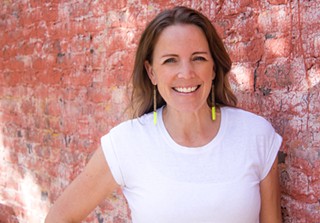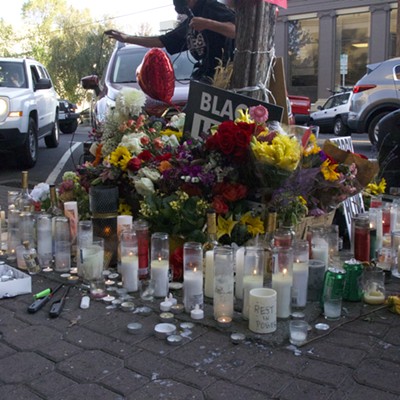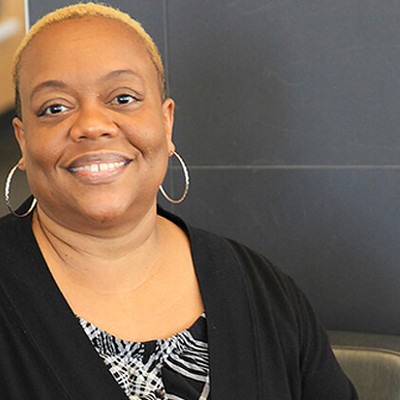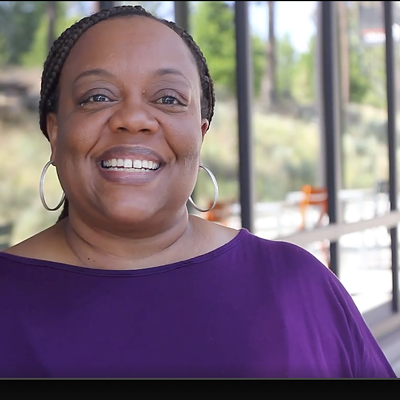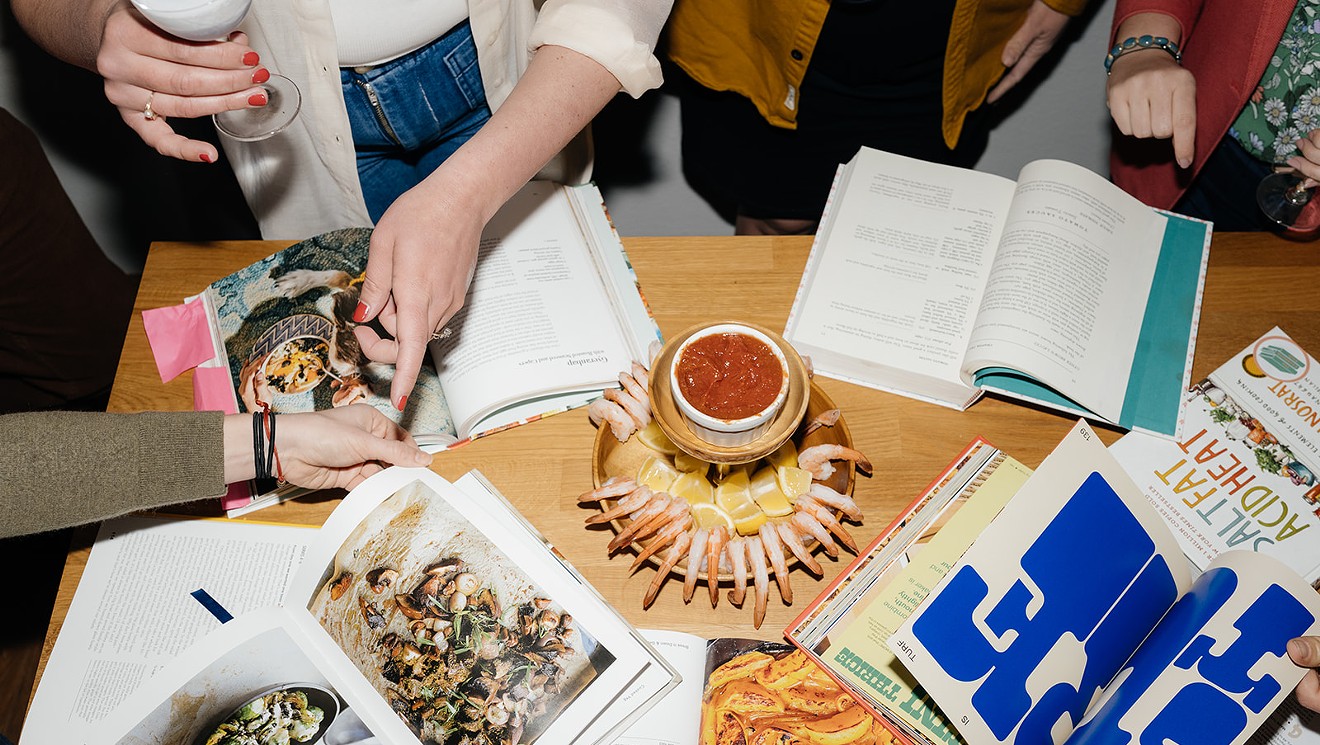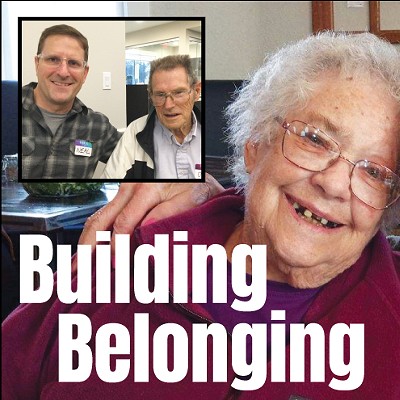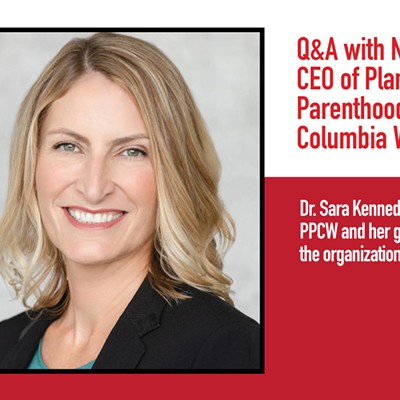Erika McCalpine, a business professor at Oregon State University-Cascades, was our 2019 Woman of the Year. This February, McCalpine and the Source launched the Love Your Neighbor project, highlighting the experiences and voices of people of color in Central Oregon.
This week, I sat down with McCalpine to talk about this moment in history.
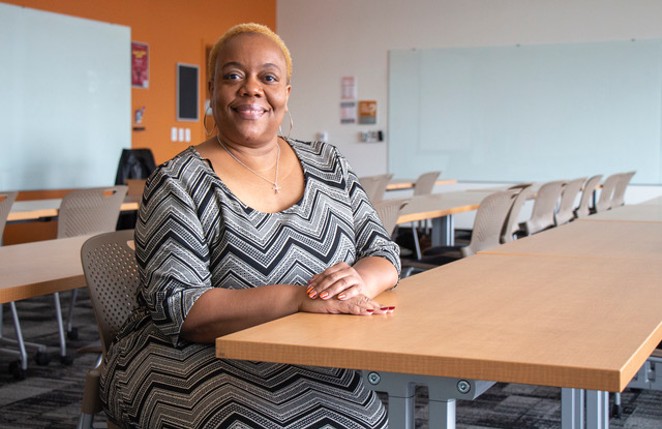
Source Weekly: This is a history making moment; we all can see it unfolding. How do we move from this moment into action, in your view?
Erika McCalpine: I think it depends on who you are, what you want to see happen. We all want to see change happen, but what does change mean? For me, I would like to see more people doing more. It’s great to say all of these wonderful things and show concern and empathy for people—but what are you going to do after this is over? And I think that it’s important for people to think about that.
If you’re a Black person, what are you going to do going forward to make sure that you’re involved in your community, so that you’re aware of future policies or future decisions that are made that impact communities of color? Being involved in your community is so important; if you can vote, exercising that right to vote, making sure that you have a say in who is making decisions about you community that you live in. Also, there are a lot of well-intended Caucasian people right now; they feel sorry and sad, but again, what will you do? I think it takes more than reading a few books about racism. It’s also being involved civically and how people that represent your local government, your state government and represent us nationally—what decisions will they make when there are tough choices on the line?
I think that everyone plays a role in who represents us in our government. I think that we all are responsible for who is in those roles. We’re coming up on a big election and it’s very important for people to consider what’s happening right now in this moment in time. Do we want it to continue the way it is? Or do we want change? If we want change, then it’s necessary for all of us to exercise our right to vote and not only vote—but hold people accountable for the decisions they make, for the actions they take or lack thereof.
PODCAST: Hear this interview in audio form, as part of the Source's Bend Don't Break podcast series:
SW: So you and I and the Source Weekly—largely based on ideas you had—developed the Love Your Neighbor project and launched it earlier this year, to a lot of success. We had a lot of plans to continue that before COVID-19 hit. For those readers who haven’t had a chance to learn about the Love Your Neighbor project, can you describe it?
EM: Just like the title says, love your neighbor. No matter who your neighbor is. For me, this was so important because I think people of color easily get lost in this community where they are a minority, more so than in any other place around the country, and it’s important for us to be seen. It’s important for people to know that we are parents, we are employees of various organizations, we’re entrepreneurs of our own businesses. We are just living here and trying to exist peacefully the same way everyone else is.
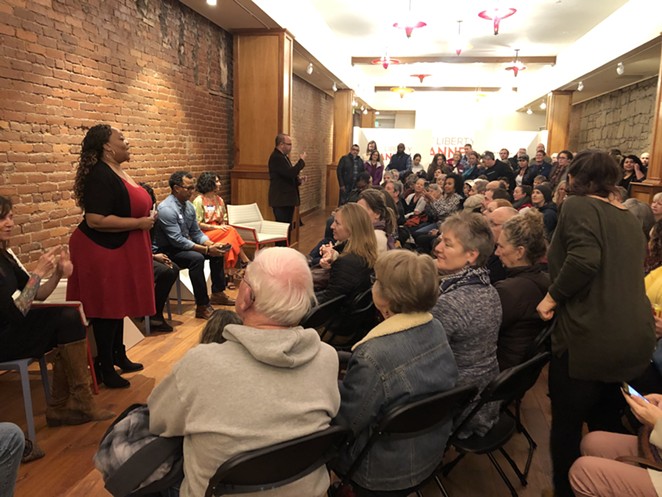
And I also felt it was important because many times, national speakers are brought to town to address issues that are happening right here, and people who live here aren’t being called on to address these issues that impact them the most. Sometimes those national speakers can cause confusion or create situations of frustration among the majority of our community. They leave and they go back to wherever they live and we, as the people of color that live here are left to deal with that anger or negative feelings. I think that I wanted to do Love Your Neighbor to show the number of people of color that live here—that there are people of color that live and work here that can have these roles to speak on issues that impact us in these communities.
Being in higher education, I'm often called on to speak or to give a thought or an opinion, however, there is more than me and I am not the voice for all people of color in Bend—so I think that it’s important to showcase that there are other people that can serve on your board, there are other people that can speak to your organization or write a statement for you. They are of color and they have this experience that they have lived, and they can speak to it better than someone who doesn’t live in this community.
SW: What was some of the feedback that you got from the first forum, which was held in February?
EM: It was great! I was so shocked by the number of people that showed up and were interested, and I was shocked by the love we felt in the room. As an organizer of the event, you and I, we didn’t know what to expect and I was concerned for the safety of the panel. We had a strong police presence there, simply because we didn’t know the types of questions we would get and who would show up, but we were met with nothing but positive questions. People were genuinely interested in us and our lives, people also wanted to share their experiences as people of color or spouses of people of color or raising children of color, so I think that that was amazing. It was awesome to know now that people have been looking for us during this, not only while the pandemic has been going on, but in response to George Floyd’s murder, asking ‘what’s happening with Love Your Neighbor?’ and so I think that speaks a lot to the impact we had on the community and that we need to get going again.
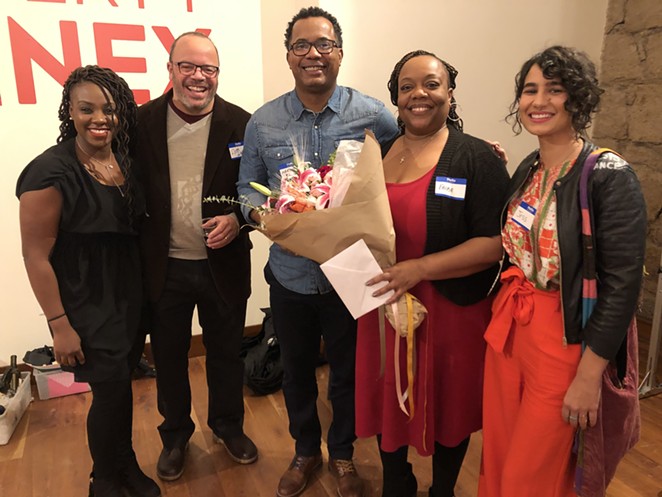
SW: Yeah, we were just getting started, and unfortunately, we had to cancel our May event. I know there was some feedback around some concern that it was a performance for white people by people of color in the community, so what’s your reaction to that?
EM: It saddens me, honestly, that people of color just can’t support other people of color. I may not do what I do the same way someone else would, but it doesn’t make it wrong and it doesn’t make it a performance. I have never approached this work as an activist. I am an educator. I educate people on various topics—and I think that it’s important for everyone that claims to be an activist or working in diversity, equity and inclusion, they need to understand that we are all needed. If only one person was needed to make change, change would have been made already, and we still wouldn’t be fighting this fight. However, it takes more than one person and it takes many different approaches to get the job done.
"If you can go about your work week or month or go through a strategic planning session and never hear from a person of color, then you’re really missing the mark, because there are people of color in this community; there are people of color who are qualified to sit at the table and have this dialogue." - Erika McCalpine
tweet this
SW: You just talked about how there’s so much work to do and it’s got me thinking about the specific actions that go beyond protest, which is happening a lot and is one arm of social change. What systems specifically in Central Oregon do you see as needing to have a re-tool or to have a look at the ways that those systems may not be serving people of color?
EM: When we think about city government elected officials, local, like the police department, the sheriff’s department, other entities—listen. Listen to people of color, hear what we are saying. And if you can go about your work week or month or go through a strategic planning session and never hear from a person of color, then you’re really missing the mark, because there are people of color in this community; there are people of color who are qualified to sit at the table and have this dialogue. Invite them to the table. Hear the concerns of people who live in this community and how policies impact their lives and learn from them and make change based on what you hear, not based on what you think.
SW: Just in terms of the police, obviously there is a lot of attention being put toward all the police departments and ideally, sheriff’s departments nationwide right now. Specifically, there have been a few things regarding Bend P.D. and extending to Deschutes County sheriffs that aren’t in place or aren’t fully in place. I'm just curious about your personal opinion on the Bend P.D. perusing funding for body cameras.
EM: I think that is imperative, especially right now. I know the fear that I have driving around town. Not that I'm doing anything wrong, that I should be afraid of the police, but just fear as a woman of color that if I am pulled over, I won’t have time to say; “Hey, wait, I'm a professor at OSU-Cascades.”
They will just see me and see my brown skin and my hair in braids and an automatic judgement will be made, as automatic judgements have been made about other people around the country. So I know that I would feel safer if police officers were wearing body cameras, especially when we see many different accounts on the news with other states where people are encouraged to turn off their own cameras when they’re encountering the police—so I think that it protects the officer and it protects the person if they are wearing body cameras. I think that is very, very important and it should be a top priority.
SW: What about de-escalation trainings and use of forced trainings? Have you had any experience locally around that?
EM: I have not. However, I think that we’ve seen enough situations to know that people of color are often met with force when other people are not. I think that if you look at the statistics of the number of Black men that are treated violently by police either physically assaulted, shot or killed versus white men that commit heinous crimes and are able to be taken in alive and before they can even be caught—their mental illnesses are being described on the news. People of color aren’t afforded the same opportunity, and that is how systemic racism occurs, that is how privilege presents itself in systems. The majority of people are given the benefit of the doubt; they have to be going through something to make them behave this way, but people of color are often assumed just to be bad and criminals. So I think that more training is needed to help break down those barriers and break down those biases that exist. And people can say they don’t have them, but we all have an unconscious bias and how it shows itself and manifests itself when you interact with people that are not like you.
SW: You teach business at OSU-Cascades. I was curious about how this moment and this time in history enters the business classroom, and does it?
EM: Most definitely. For me, I teach ethics and corporate social responsibility, and so these types of situations show the ethical behavior within organizations. The most recent thing that I heard about is where the two police officers were suspended in Buffalo, New York for pushing down a 75-year-old man and 57 other officers resigned in support of the two that were suspended. I think that all 59 of them should be targeted, because to say that over 50 officers are going to support two that we saw push down an elderly man and left him bleeding from his head on a sidewalk, and you want to support that? It shows the problem within the system. So the ethical makeup of the organization is certainly something that I could speak to in the classroom.
I do know that when the George Floyd murder happened, I had to tell my students: “This is going on, and I'm impacted by this, so I'm sorry if I don’t seem like myself today.” It was a rough week to get through in terms of having classes. But I also don’t think that people understand that when people of color deal with these types of situations, we still have to show up for work, we still have to be professional, we still deal with micro-aggressions from our colleagues, and we’re expected to have the same smile on our face at every encounter and it’s hard, the emotional impact of these events on people of color is not considered in most circumstances. I'm fortunate in that most of my colleagues have been supportive, but not everyone can say the same thing and I think that more people need to think about that. That when something like this happens on a national scale, it impacts all of us in very different ways.
SW: Are you saying that in the workplace, maybe checking in with an employee…?
EM: Definitely, definitely check in on your employees… I saw many posts on social media saying to check on your friends of color, they’re not OK, and that’s true. Even if it’s just “How are you” over text, “Is there anything I can do, do you need to talk,” and maybe they don’t. Maybe they don’t want to. But just knowing that you reached out may mean more to them than you realize.
SW: Just thinking about business in general—we talked about checking in with employees—but in terms of local businesses… I know that some businesses have boarded up downtown in Bend, in preparation, in that they think the protests could get violent. In your perspective, what is the call for local businesses right now during a time like this?
EM: I can see both sides, honestly. Those that are chains of larger businesses may be getting instructions from their corporate office to board up because of what’s happening in New York City. But I also think that they want to protect their assets; they want to protect what they’ve worked hard to build and I understand that. However, if you look at the census data, the majority of Bend is not of color, and a lot of these protesters have not been of color to think that they are going to turn violent. Again, I can’t fault them. However, to be in a public setting like on the news or in the paper saying, “I want to protect what’s mine and I'm going to sleep in my store all night long just in case.” That can have an impact too on shoppers at your store after all of this is over. So, I can understand wanting to protect and even taking the action to protect but saying things like that… I’d just give thought to how that might impact my business going forward.
"One thing we hadn’t talked about is what it’s like to be the mother of a black son in a place like Bend. I'm so thankful that he hasn’t been in school throughout the George Floyd murder and the backlash and the protests, so that he doesn’t have to explain to his friends what it’s like to be black while all of this is happening." - Erika McCalpine
tweet this
SW: What you said got me thinking… you said that there may not be a member of the congregation that’s a person of color, and I think that it’s easy for people— especially in a place, according to the new census data, that is 92 percent white, but slowly growing in population. It’s easy for people to say, “Hey, I don’t have a person of color in my workplace. I don’t have one in my class. I don’t have one on my street.” And what does that do when someone thinks like that?
EM: First, I want to say that you never know who someone is just because visibly you can’t tell. There are many mixed-race people that live in Bend and you don’t know how they identify or what race they identify with, so I think it’s always best to lead with a culture of care and concern. All of us; this entire world watched a police officer hold his knee on the neck of another human being for eight minutes and 46 seconds until he died. That is traumatic for anyone that sees it and I think that it’s responsible; it’s only the right thing to do for a workplace to show care and concern for their employees after seeing something like that. The same goes for a church and their parishioners, the same for a congregation, the same for friends, the same for parents of children. You check in and make sure that people are OK and that if support is needed, then it’s provided. And they know what resources are available for them if they need them.
SW: Is there anything else you want to talk about before we wrap up?
EM: One thing we hadn’t talked about is what it’s like to be the mother of a Black son in a place like Bend. I'm so thankful that he hasn’t been in school throughout the George Floyd murder and the backlash and the protests, so that he doesn’t have to explain to his friends what it’s like to be Black while all of this is happening. He’s only 14, and he shouldn’t have to explain, and I just want to ask people to remember that. If you know someone of color, just understand that they are unpacking this the same way you’re unpacking it. None of us have all the answers; none of us can tell you what to do; none of us can make you feel better about what happened or your feelings about what happened.
However, what we can do is try to come together as a community and say that that type of behavior from our police officers, our sheriff’s department is unacceptable, and it won’t be tolerated in this community. And while I am so fortunate to live here and to be able to raise my children here, I want to do all I can to make sure this community remains a great place for everyone to live. I want it to be a place where everyone is comfortable to live. And one day, there will be more people of color that live here. I want to my part in making sure that we build an inclusive culture, so that those people do feel welcome when they come.
Stay tuned to our print and web editions for upcoming announcements about future Love Your Neighbor events.

